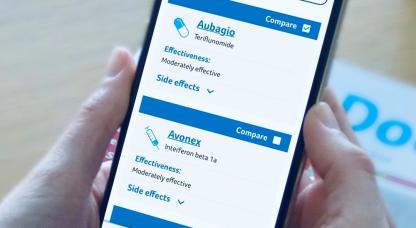Laquinimod was developed as a treatment for multiple sclerosis. It is taken as a tablet, once daily.
In May 2014, the EMA (European Medicines Agency) confirmed an earlier decision to refuse a licence for laquinimod for treating relapsing remitting multiple sclerosis.
Following disappointing results in clinical trials, the manufacturer decided to discontinue development of laquinimod in MS.
Laquinimod for primary progressive MS: Phase II

Laquinimod for relapsing remitting MS: Phase III

- Laquinimod has a number of actions on the immune system and may limit demyelination and axonal injury.
- In phase III studies of relapsing remitting MS, laquinimod reduced relapses by 23% compared to placebo. It has also been shown to reduce disability progression and brain volume loss. However, in subsequent studies laquinimod did not slow down disability progression in relapsing remitting MS (CONCERTO) and did not reduce loss of brain volume in primary progressive MS (ARPEGGIO).
- Few serious side effects occurred in clinical trials. The most common side effects have been:
- back pain
- increased liver enzyme levels
- headache
- In May 2014, the EMA (European Medicines Agency) confirmed an earlier decision to refuse a licence for laquinimod for treating relapsing remitting multiple sclerosis.
Laquinimod affects the levels of certain cytokines (substances released by immune cells) and reduces the passage of immune cellls into the brain and spinal cord. Laboratory investigations have suggested it may have both neuroprotective and anti-inflammatory actions.
Laquinimod is taken as a tablet, once a day.
Laquinimod has been well-tolerated in clinical studies. The most frequent side effects are:
- back pain
- increased liver enzyme levels
- headache
In a phase II study a more serious side effect occurred, resulting from a blood clot in the vein leading from the liver.
A phase II study of oral laquinimod (0.3mg) concluded that it was well tolerated and effective in suppressing development of active MRI lesions in 209 people with relapsing remitting MS. Treatment over six months resulted in a 44% decrease in MRI disease activity. People with disease activity at the start of the study showed a decrease of 52%.
In a second phase II study of 306 people with relapsing remitting MS, laquinimod was given at two different doses (0.3 and 0.6mg) for nine months. The higher dose (0.6 mg per day) significantly reduced the number of active lesions seen in scans from month six onwards. The lower dose (0.3 mg) was not effective.
Upon completion of these phase II studies, participants were enrolled into a 36-week extension study during which all participants received a daily dose of laquinimod of either 0.3mg or 0.6mg. An average 52% reduction in the number of active lesions on MRI was seen in the group who were switched from placebo to either the 0.3mg or 0.6mg dose of laquinimod in the extension study, while the reduction in the average number of active lesions seen in the groups receiving laquinimod in both the initial study and the extension study, was sustained at around 40%.
Three phase III studies have provided further data.
ALLEGRO - laquinimod compared with placebo
Over 1100 people with relapsing remitting MS in 24 countries received a daily oral dose of 0.6mg laquinimod or a placebo (dummy pill) for two years. Those on laquinimod showed a 23% reduction in annual relapse rate, a 36% decrease in disability progression and a 33% reduction in brain volume loss. Laquinimod appeared to be safe and well tolerated with few adverse events.
A detailed analysis of brain volume loss reported that laquinimod may reduce (at least in the initial phase of treatment) some of the more damaging effects of MS on the brain.
BRAVO - laquinimod compared with Avonex
This study compared laquinimod 0.6mg with interferon beta 1a (Avonex) and placebo (1332 participants). Over the two year study period, the relapse rate in people treated with laquinimod was 0.28, compared with 0.34 for placebo, a difference which was not statistically significant. Further analysis of the data which took account of differences in the two treatment groups at the start of the study gave laquinimod a statistically significant lower relapse rate (0.29 on laquinimod vs 0.37 on placebo), equivalent to a 21% reduction in relapse rate.
Laquinimod reduced the risk of disability progression at three months by 33.5% compared with placebo and at six months by 40%. Beta interferon had no significant effect on disease progression compared to placebo.
CONCERTO - laquinimod compared to placebo for relapsing remitting MS
CONCERTO compared two doses of laquinimod (0.6mg and 1.2mg) to placebo in approximately 1,800 people with relapsing remitting MS for up to 24 months. Following concerns about cardiovascular side effects, the higher dose was discontinued. The main aim of the study was to test whether laquinimod could slow down disability progression confirmed at three months.
In a press release, the manufacturer announced that laquinimod did not reduce progression of disability at three months compared to placebo. In addition, laquinimod had no effect on disability progression confirmed at six and nine months. However, compared to placebo, laquinimod significantly reduced loss of brain volume, time to first relapse, annual relapse rate and active lesions seen on MRI.
Further details of the study will be presented at a scientific meeting and published in a peer-reviewed journal.
ARPEGGIO - laquinimod compared to placebo for primary progressive MS
ARPEGGIO was a phase II study investigating the effect of 48 weeks treatment with two doses of laquinimod (0.6mg and 1.2mg) or placebo on brain volume changes in 375 people with primary progressive MS. The study also recorded progression of disability, new lesions measured by MRI and cognition. Following concerns about cardiovascular side effects, the higher dose was discontinued.
In a press release, the manufacturer announced that laquinimod did not slow down the loss of brain volume after 48 weeks of treatment and did not slow down disability progression. There was a reduction in new active lesions in people treated with laquinimod.




